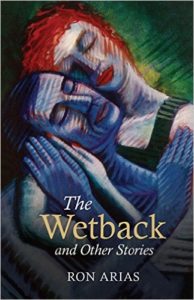Review: THE WETBACK AND OTHER STORIES by Ron Arias (Peru)
 The Wetback and Other Stories
The Wetback and Other Stories
Ron Arias (Peru 1963–65)
Arte Publico Press
September 2016
160 pages
$17.95 (paperback)
Reviewed by Kathleen Coskran (Ethiopia 1965-67)
•
In The Wetback and Other Stories, Ron Arias’ tales are both loving and strange, loving because the setting is most often in a close-knit neighborhood where wisdom is often carried by children and old people, and strange because he frequently slides effortlessly into magical realism.
His gift is perhaps best embodied in the title story, “The Wetback.Æ The body of a young man is discovered by children in the dry riverbed of the Los Angeles River and becomes an object of awe, admiration, and love for the whole neighborhood.Young and old gather to look at him; they undress him, admire him, name him, and help an elderly spinster take him (the body) home, unleashing a series of events that, for this reader, are strange and unexpected, but told with a calm and tenderness that characterizes many of these remarkable stories.
Several of the stories are set in a Los Angeles neighborhood called the Elysian Valley where the line between the “real” world and the world of magic and imagination is often crossed without comment, surprise, or, sometimes, explanation. In “Lupe” the birth of a nine-pound eight-ounce hermaphrodite sets off an epidemic of fasting and starvation among the community, a plague so severe that it receives national attention until the outbreak is simply resolved by a bookish neighbor Fausto, an old timer from Chihuahua.
Life is not always that smooth and neighborly in Arias’ fiction, but many of the stories are populated with unlikely friendships. In “Castle” the boy Carlos, overprotected by his fearful mother while his father is a prisoner of war, finds solace and companionship with “King” Sam, an elderly man who lives in a “castle,” the detritus of an abandoned construction project at the top of the neighborhood hill. As is true of many of the relationships in these stories, Carlos and King Sam cloak the hard reality of their lives with fantasy, story, and deep affection.
Like all good writers, Arias believes in the power of story and, in the final tale in the collection, “The Story Machine,” a tape recorder magically unfolds a story in the voice of whichever child holds the machine, a story that is both compelling and predictive. Arias pulls us naturally into magical realism and often empowers children to carry the thread of the narrative, because, as we all know, children are closer to the blurry boundary between “real” and imagined worlds and, luckily for the reader, Arias has a natural storyteller’s grasp of both realities.
As he says in the Author’s Note, Arias was driven to write fiction to make sense of his own life and life in general, but “then for about 30 years…jumped into a roller coaster of real-life stories as a journalist with a global beat, often feeling like a character in (his) own reported stories.” He was nominated for the National Book Award in 1975 for his novel, The Road to Tamazunchale, and has published several non-fiction books. With The Wetback and Other Stories, Arias has returned to fiction writing to help us all make sense of our own strange and wonderful lives.
•
 Reviewer Kathleen Coskran (Ethiopia 1965-67), writer and teacher, has appeared in several anthologies and her collection of short stories, The High Price of Everything, won a Minnesota Book Award as did Tanzania on Tuesday: Writing by American Women Abroad which she co-edited. She is the recipient of numerous awards, fellowships and residencies including a National Endowment for the Arts Fellowship, a Bush Artist’s Fellowship, and two grants from the Minnesota State Arts Board. She is currently writing flash fiction on her blog: http://pocketstories-kcoskran.
Reviewer Kathleen Coskran (Ethiopia 1965-67), writer and teacher, has appeared in several anthologies and her collection of short stories, The High Price of Everything, won a Minnesota Book Award as did Tanzania on Tuesday: Writing by American Women Abroad which she co-edited. She is the recipient of numerous awards, fellowships and residencies including a National Endowment for the Arts Fellowship, a Bush Artist’s Fellowship, and two grants from the Minnesota State Arts Board. She is currently writing flash fiction on her blog: http://pocketstories-kcoskran.

Arias is a writer of the highest value. According to my late friend and dear guide Josephine Miles
“the power of literature was the power to point, denote, evoke the thing itself….But it was very hard to tell what was the thing itself. How to get at it? By naming it? by describing? by relating to responses–then no longer ‘in itself’? The urgencies of Hemingway, Santayana, Stevens, Williams, different as they now seem to us, all shared at that time the feeling of rediscovery of new values in objectivity, though ways toward it were not always clear.” p.119, POETRY AND CHANGE, U of C Press, 1974
Ron Arias belongs in the charmed circle of great American writers.
Thanks, Ed, very flattering. I’m quite humbled by the comparisons but I do like the references.
Great review. I read Ron’s “My Two Wars” and just went to Good Reads to add this to my list of book to read. I really appreciate Ron’s ability to move into “mystical realism”–a rare ability for any writer.
I spent a lot of time to find something like this